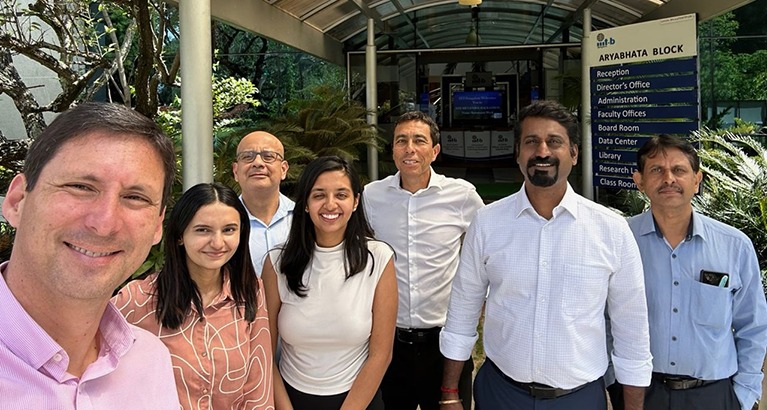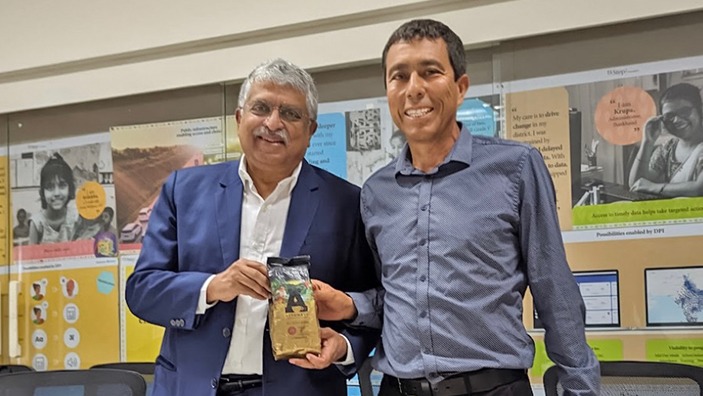Bengaluru, India’s Silicon Valley, has honed world-class IT expertise by serving top US businesses for decades. Nandan Nilekani, Infosys co-founder and Chairman, envisioned deploying these capabilities to tackle key societal problems at scale. As a result, India has emerged as a global leader in leveraging digital technology to enhance citizens’ lives and drive innovation, as outlined in our recent report.

Our Cambridge Innovation Hub was extended the privilege of exploring Bengaluru’s Nilekani think tanks, alongside 2 exceptional Peruvian entrepreneurs, Ruben Sánchez and Cesar Antúnez de Mayolo. During our visit, we delved into these remarkable institutions:
1
Aadhaar (ID) and IIIT
The Post Office showcased the remarkable speed and efficiency of citizens updating their IDs, opening bank accounts, and acquiring QR codes for payments. Their strong user-centric approach explains the widespread adoption of digital utilities in the world’s most populous country. Adjacent to the impressive Infosys Campus, we visited the International Institute for Informational Technology Bengaluru (IIIT), a premier research institute. There, in a modern demo shop, my colleague Ruben received a MOSIP ID and experienced an Open Government to Person payment demonstration, leaving us all impressed.
2
EkStep Foundation
Tucked away in the Koramangala district, Ekstep may seem unassuming but plays a pivotal role in providing learning opportunities for over 200 million primary school children. Ekstep’s “One Plus” thinking promotes small changes that yield substantial user benefits for users while ensuring that these changes are maintained. Their innovation led to the linking of over 600 million schoolbooks via QR codes to digital content, referred to as ‘energised’ books. Additionally, Ekstep developed an online teacher training program with verified credentials, and a similar system requested by the Prime Minister for training government officials.
3
e-Governments Foundation
In close proximity to EkStep, both geographically and in approach, the e-Governments Foundation has supported cities and states for over two decades, starting with Bengaluru. Their pioneering efforts have streamlined the delivery of affordable and accessible government services. With a deep understanding of government needs and capabilities, its digital approach and tools have been successfully replicated in numerous Indian cities and states.
4
FIDE (Foundation for Interoperability of the Digital Economy)
Our journey concluded at FIDE, located in a WeWork co-working space. FIDE focuses on providing a seamless digital commerce experience through the promotion of the Beckn e-commerce protocol – a project Forbes considers one of Nilekani’s most impactful endeavours since the national ID initiative. FIDE also emphasises building Beckn supporter communities through Beckn Open Collective Chapters, which power community applications akin to a Super Uber, like Nama Yatri, launched by the Bengaluru Auto Rickshaw Drivers Union.
Visiting these think tanks was a unique professional experience. Before our Bengaluru expedition, the question of how a relatively low-income country could outshine others in the effective use of digital technology for improving lives and driving innovation remained unanswered. However, conversations with these extraordinary think tanks revealed that the secret lay in their collaborative, friend-like approach, driven by a shared passion for democratising digital access, promoting innovation and competition, and enhancing citizens’ well-being.
Their approach prioritised open standards and open-source solutions, breaking complex problems into manageable micro-problems solvable at scale. By identifying minimal standards (“rails”) upon which diverse decentralised solutions can be built, they embrace the philosophy of “less is more”. This counterintuitive strategy has been instrumental in their success, allowing local solutions to emerge and be redeployed elsewhere. Politicians, civil servants, and citizens in India have direct experience with the benefits of this digital approach, earning their trust and advocacy. We hope that other nations, from the United Kingdom to Peru, will see India’s digital journey as a playbook for leveraging digital technology, including AI, to benefit all citizens, promote competition and foster innovation.





